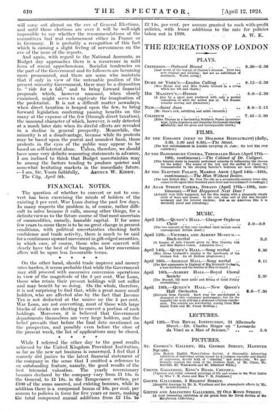FINANCIAL NOTES.
The question of whether to convert or not to con- vert has been exercising the minds of holders of the existing 5 per cent. War Loan during the past few days. In many respects the problem is, of course, rather diffi- cult to solve because it calls, among other things, for a definite view as to the future course of that most uncertain of commodities, namely, loanable capital. If for some few years to come there is to be no great change in present conditions, with political uncertainties checking both confidence and trade activity, there is much to be" said for a continuous upward movement in gilt-edged securities, in which case, of course, those who now convert will clearly have the best of the bargain, as later conversion offers will be upon less favourable terms.
* * * * On the other hand, should trade improve and money rates harden, it seems probable that while the Government may still proceed with successive conversion operations in view of the magnitude of the 5 per cent. War Loan, those who retain their present holdings will not suffer and may benefit by so doing. On the whole, therefore, it is not surprising to find that, while a great many small holders, who are affected also by the fact that Income Tax is not deducted at the source on the 5 per cent. War Loan, are not converting, most of those with large blocks of stocks are electing to convert a portion of such holdings. Moreover, it is believed that Government departments themselves are very large holders, and the belief prevails that before the final date mentioned on the prospectus, and possibly even before the close of the present week, the list of applications may be closed.
* * While I referred the other day to the good results achieved by the United Kingdom Provident Institution, so far as the new net business is concerned, I feel that scarcely did justice to the latest financial statement of the company in the sense that I omitted a reference to an outstanding feature, namely, the good results of the first triennial valuation. The yearly reversionary bonuses declared by the company vary from El. 15s. in the General, to £1 18s. in the Temperance. section, per £100 of the sums assured, and existing bonuses, while in addition there is a compound bonus of 16s. per cent. per annum to policies in force for five years or more, making the total compound annual additions from £2 DI. to £2 14s. per cent. per annum granted to such with-profit policies, with lesser additions to the rate for policies










































 Previous page
Previous page